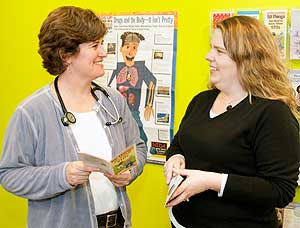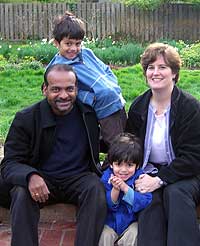When Katie Plax, M.D., talks about her life and career, there’s one concept she repeats often: how lucky she is.

But it’s more than luck that has gotten this Washington University pediatrician to her role as director of the Adolescent Center at St. Louis Children’s Hospital.
“We are incredibly fortunate to have Katie Plax as a member of our School of Medicine faculty,” says Alan L. Schwartz, Ph.D., M.D., the Harriet B. Spoehrer Professor and chairman of the Department of Pediatrics. “She is the real deal — a gifted clinician, a passionate advocate for children and teens, especially those challenged by suboptimal family and life circumstances, a committed educator and a revered role model for so many junior faculty. If ‘impact’ is the coin of the realm, Katie delivers.”
Plax did not always want to be a doctor — she started undergraduate premedicine courses at Brown University but ended up earning a psychology degree. She first worked at a nonprofit agency with pediatric hematologist/oncologist Peter Smith, M.D., at Brown University, who cared for boys with hemophilia who became infected with HIV. Smith worked with parent organizations at schools to allow the boys to attend school.
“I went out with him on these presentations, and I thought to myself, ‘That’s the kind of doctor I want to be,'” she says.
She went back to school at night to finish premed courses. During medical school, she continued to work on issues related to HIV, teaching community groups and volunteering at a homeless shelter.
“It was very clear then why I wanted to go into medicine — to work with an underserved community,” she says.
She came to Washington University and St. Louis Children’s Hospital for her residency and then went to work as a pediatrician at St. Louis County’s John C. Murphy Health Center in Berkeley, Mo. Less than a year later, the county reorganized its health-care model and released its physicians. That’s when the door to Plax’s interest in politics and academic medicine opened. She joined an effort opposed to the reorganization and learned about the county political system.
“During this experience, I met a lot of people in the community who were interested in caring for underserved families, and it gave me the opportunity to develop skills that you don’t necessarily get to develop in medicine, like speaking at a County Council meeting or writing letters to the editor,” she says.
She also developed a relationship with Lynn White, M.D., then director of the Adolescent Center at St. Louis Children’s Hospital, who offered Plax a job.
“I was incredibly lucky because I had this model doctor of someone working in the community serving a population of adolescents in need and who was willing to do the needed work to advocate for patients,” Plax says.
Before she left John C. Murphy, Plax noticed that 40 percent of the center’s patient population was uninsured, despite Missouri’s policy that allows children to get state coverage. Working with Legal Services of Eastern Missouri, she trained volunteers to help uninsured families enroll in Medicaid, now known as the Children’s Health Insurance Program (CHIP). In addition, she started exploring changes to current policies that would make it easier to enroll children in the program.
At the same time, she received a two-year fellowship through the Soros Foundation. This allowed her to spend about half of her time working on what led to a state policy called presumptive eligibility, which allows income-eligible children to be immediately enrolled in Missouri’s CHIP program at community sites without a waiting period.
Splitting time

Plax splits her time between patient care and advocacy. She has been legislative chair for the Missouri chapter of the American Academy of Pediatrics since 2004. She continues to work on expanding CHIP coverage in Missouri using funds from the federal stimulus package as well as working with the state to use stimulus funds to reverse cuts to health and social service agencies.
She also spends some of her free time in politics and says she loves to work on campaigns. Last fall, she canvassed for President Barack Obama and attended his inauguration.
On the SPOT
When she started working in the Adolescent Center at St. Louis Children’s Hospital, pediatricians were beginning to treat teenagers who had been infected with HIV at birth as well as those who had behaviorally acquired HIV. Plax joined the team and now spends one half-day a week in the hospital’s teen HIV clinic.
Her love of medicine and advocacy combined again in 2008 when she became medical director of the SPOT (Supporting Positive Opportunities for and with Teens). The first of its kind in the St. Louis area, the SPOT is a one-stop, drop-in center for youth ages 13-24 that provides testing for HIV and sexually transmitted diseases, health care and counseling, social support, prevention and case management services at no cost.
Since its September 2008 opening, the SPOT has treated nearly 1,000 individual youth and tested more than 500 for sexually transmitted diseases, including HIV.
“It’s really rewarding to see this model work and to see the young people who come to the SPOT now referring people to us — to me, that’s the ultimate seal of approval,” she says.
Regina Whittington, director of the SPOT, says it is a privilege to work with Plax.
|
Katie Plax |
|
Education: B.A., Brown University; M.D., University of Rochester Title: Associate professor of pediatrics, medical director of the SPOT and director of the Adolescent Center at St. Louis Children’s Hospital Also directs: A pediatrics rotation called Pediatricians in Community, which allows residents to make patient home visits with community social services agencies to give residents a deeper understanding of how the agencies help families Hobbies: Cooking, gardening, playing outside with her sons, travel, reading and politics Fascinated with: The Supreme Court. “I read the biography about former Supreme Court Justice Harry Blackmun,” she says, “and I loved ‘The Nine.’ “
|
“Dr. Plax is one of the most inspirational physicians I have ever met,” Whittington says. “Her presence at the center is a powerhouse of resources for youth accessing services. She approaches medicine in a practical manner and empowers youth with knowledge and understanding. She doesn’t just see a patient, she forms a relationship and advocates for them. Her work is not confined to an exam room — she is actively engaging in the community and determining action that can be taken to promote and foster a healthier life.”
Plax is quick to praise the SPOT staff for their role in the project’s early success.
“Frankly, I’ve been incredibly fortunate that I have the most amazing people to work with and who share the vision,” she says. “Sometimes you get to dream about things you’d like to see happen. I got to dream about this, I got to go out and do it, and everybody was excited about doing it with me. How many times do people get to do that in their life? That’s just a huge gift.”
Plax is sharing her passion and vision for underserved teens with resident physicians who are helping out at the SPOT.
“I’m excited about that because I think about what Peter Smith did for me,” she says. “I think sometimes you just need to see things in living color and expand people’s horizons about what doctors can do. We’re only limited by our own creativity, and I’m hopeful that I can pass on that good hands-on message.”
A close family
Plax and one of her brothers, Danny Plax, M.D., instructor in clinical pediatrics at the School of Medicine and a pediatrician in private practice, had another pediatrician role model — their father, Steven Plax, M.D., professor emeritus of clinical pediatrics, who she says loved his job, was good at it and set a very high standard of what a pediatrician can be and can do. She also says both parents set an incredibly high standard of how to be a good parent.
Plax and her partner, John Cross, have two sons: Jacob, 6, and Jeremy, 2. The family likes to do anything outside, including playing ball and gardening. She also loves to cook, and each week, Plax and her family get together with her parents and Danny’s family for Sunday night dinner. She also has two brothers who live in Chicago.
Plax says the support of Cross, her family and her colleagues have helped her balance the demands of a career and a family.
“One of the things I see again and again at the SPOT is that not everybody has a family they can rely on,” she says. “I have a family I can rely on.
“One thing that’s very clear personally and professionally is that you can’t do it alone. If you can find those partnerships, it makes a huge difference.”